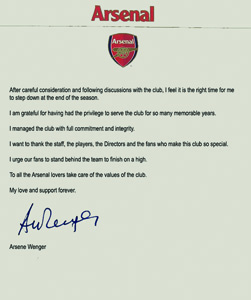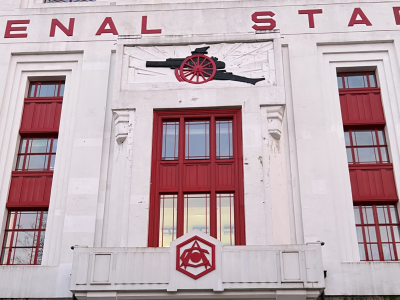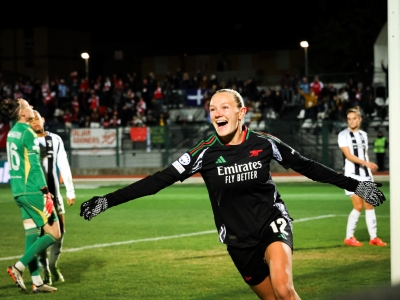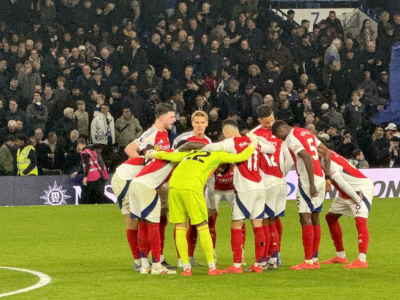Ed’s note… Where to begin? This article should have appeared on pages 76 & 77 of our ‘Au Revoir Arsène’ special edition that sold out at the Burnley game. It was a titanic effort to get an 84 page edition to the printers in time, and unfortunately, on the spread for this piece, the words from another article were printed instead of Simon Rose’s, due to the guy doing the layouts using another spread as a template, and forgetting to flow in Simon's text. It should have been spotted subsequently by me, so the blame is not solely on one person. Our profuse and sincere apologies to Simon. All we can do is ensure his words see the light of day, although the error will be corrected for the e-edition of the special, which should be available from tomorrow. We’ll post details of that once it’s ready.
Even the most lavish bathtub in the world needs a reliable plug, or the water will just drain out. Arsenal's Invincibles went the entire 2003-04 league campaign unbeaten and the 2002 double-winners also avoided away defeat all season. I was at Newcastle recently as we succumbed to our fifth successive away league defeat of 2018, and there were few complaints from our visiting section. No planes flying banners unlike last season’s angry scenes, no “Wenger out” chants, no fighting among different factions of our support. Just resignation. For the third time in that run we had scored first, but still lost. It doesn't matter how well you attack, if you cannot defend you simply don't have a complete team. Any manager overseeing such a racket cannot last. You cannot achieve anything in football if you cannot defend.
Arsène Wenger's announcement that he would leave Arsenal at the end of this season was not entirely unexpected, but it was still something of a shock. It had slowly become a widespread given across much of the fanbase that Wenger needed to be superseded one way or another, but it was still surprising that this was genuinely happening, partly for the timing of the decision. Many had hoped that such news would come before the campaign ended, to lift the despondent mood on and off the pitch, perhaps to save our chance to win the Europa League, but most observers thought that any such decision might come once the season had ended, for a quiet uncontroversial exit. Not so.
Much has been made - and will continue to be made - about the timing of Wenger's exit announcement, whether or not he was sacked and where the power and timing lay in that decision. The “Merci Arsène” packaging of the announcement on arsenal.com was a celebratory way to secure the narrative and fend off deeper immediate scrutiny. Ivan Gazidis's presser later that day paid a well-polished and evocative tribute to Wenger, but it neatly dodged questions about the timing and ownership of the decision, and about Arsenal's level of preparation for replacing a manager of 22 years.
Was Wenger pushed? The club and Arsène are doing their best not to say, and the only ITKs are those directly involved, but something within the timing pricked up my ears. Following the Newcastle defeat on April 15, Wenger gave a pre-West Ham presser on April 19 and was asked about his future. He replied "My personal situation is not so much my worry at the moment. My worry is to transform a season with so many disappointments away from home into success. That's what matters." When pressed on the swathes of empty seats at home games, Wenger added "It's not a concern. Our crowd is solid at the moment." Not a concern to you maybe, Arsène, but a concern perhaps to others.
These Wenger comments were not hugely dissimilar to others he has given at times this season, but I didn't feel that previous Wenger comments had openly cited specific failings. Normally he focuses on the task of achieving upcoming positives, not reflecting on weaknesses. I thought "Who are these comments for? Is something happening here?” I wondered if Wenger was making those comments for an internal audience, like Gazidis, Sanllehi, Josh Kroenke or maybe even Stan directly. Was he suddenly under greater pressure? I didn't think too deeply about this, as Wenger has responded to such queries before, but I just sensed something in his answers, a different angle. I wondered if Wenger was aware of senior executives circling, manoeuvring for this summer to be the time to part. I didn't expect what came next though.
When Wenger's exit announcement came, my immediate thought was that maybe Stan hadn't appreciated those Wenger comments from the pre-West Ham presser. Yes, there have been a lot of disappointments, haven't there. No, the masses of empty seats are a concern and their consistent emptiness is the main thing solid right now. Given that the Wenger decision was taken on the evening of April 19, later on the day of the above presser, I couldn't help but feel that on that fateful Friday morning perhaps Stan Kroenke was not best pleased by Wenger’s tone and narrative and that an incoming decision was actioned there and then. This exit decision did not come from a standing start. Once a sink has been filling up for some time, it only takes one more drop for water to spill over the sides. The straw of Wenger’s continued presence at Arsenal had long since broken the camel's back of many fans' discontent, but perhaps Stan Kroenke's final straw was Wenger's comments in that pre-West Ham presser.
It’s the timing that stands out for me. The Newcastle away defeat meant that Arsenal were the only league team in England to have lost all of its away league games this calendar year. But that was the Sunday; Wenger was still in charge to take the pre-West Ham presser on the Thursday morning, ahead of facing the Hammers on the Sunday. Wenger was ousted on the night of that presser, with the announcement the following morning. Something moved Kroenke to make that decision. Perhaps Gazidis reported back displeasure on Wenger's comments and Kroenke drew the line. But whichever way you look at it, an exit announcement in the run-up to a game is not the same as one closely following a record sequence of defeats. If you’ve decided that results alone merit the sack, that tends to come quite soon after the most recent game, not shortly before the next one. Wenger had not only reached the stage where his team could no longer defend away from home, even when winning, but also where he could not defend his own record and equally had no defence for fan apathy. The players had, to some extent, turned their back on Wenger, at least away from home, but the home crowd had now increasingly turned their back on Wenger too, by failing to fill their own pre-paid seats. Stan Kroenke has now, ultimately, turned his back on Wenger too.
I long held a consistent position over Wenger’s tenure at the club, during the years of debate over his future; Wenger has always said that he would not break a contract and the club have never looked likely to sack him, so I regarded the likeliest exit to be at the end of a contract. That moment could have been 2014. We just about beat Hull to win the FA Cup and end our nine-year barren run without silverware. To get a three-year deal then miffed many, but I read it as three years to make a credible title challenge. Three years later and we hadn't managed that, but had won two more FA Cups, the last against the odds, in beating Man City and Chelsea to land it. I do wish Arsène had made the break then, last summer. Two more years to win a title? I took his new deal as perhaps bridging the gap until Arsenal were ready, structurally as a club, to replace him. Perhaps vanity made him stay. Perhaps the club couldn't replace him at that point and asked him to hold on. Whatever the truth, the club has certainly decided that they are ready now.
Arsène Wenger has been an astounding Arsenal manager, on and off the pitch. I have enjoyed and admired him so much, as an Arsenal man and as a person. Such class, intelligence, wit and humanity. And plenty of success. Wenger has brought me so much pleasure as an Arsenal supporter. It's a much-vaunted life ambition to 'go out at the top', to leave a party while you're still having fun, so it's awkward that he could not gauge the right time to step away from the club that he loves. Arsène Wenger will rightfully remain an Arsenal legend to many and the highs should always override the lows; it's just a shame that he will drift away this summer, seemingly against his wishes, having somewhat lost the players, certainly many of the fans and, crucially in the end, his employer.
The final match that could yet have afforded Wenger a glorious departure – the home leg against Atletico Madrid – only served to illustrate the uncomfortable truth. That 1-1 draw was yet another match of promise, where attacking intent was undone by a fatal openness in our back line. How very Arsenal of Arsène Wenger’s Arsenal to present a high defensive line at 1-0 up in a massive game, only for a full-back to play a top striker onside, a central defender to kick the ball into his own face when trying to clear the danger, and for his partner then to slip and fall over when straining to block the goal-bound equaliser. That sequence would make a great meme in the style of a renaissance painting at the National Gallery. How as a manager do you talk yourself out of that not being good enough? How do you pass off more proof that your methods no longer make you competitive? The unfortunate evidence against Arsène Wenger, repeated against Atletico even after the announcement of his impending exit, was that once again sadly no defence was no defence.
Twitter@thatsimonrose







